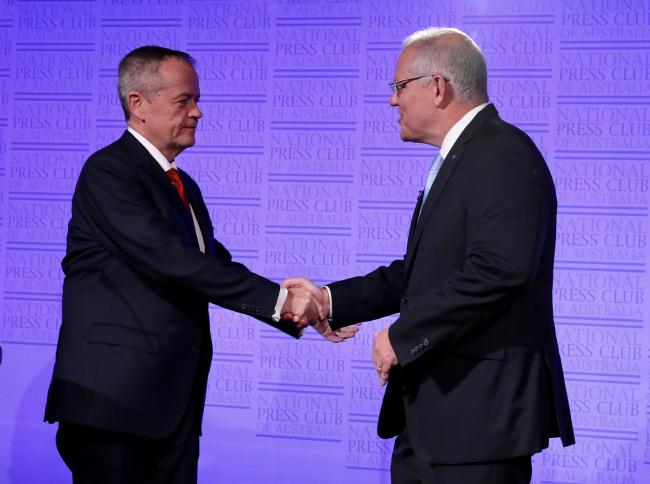(Bloomberg) -- Prime Minister Scott Morrison is fighting to save his conservative government in Australia’s election Saturday, with polls showing the left-leaning Labor party poised to win office.
More than 16 million Australians are casting votes, with 151 lower house seats and 40 in the Senate up for grabs. While Morrison, 51, has closed down Labor’s lead during the five-week campaign with his promise of sweeping tax cuts and record of sound economic management, a third term in office for his Liberal-National coalition may be out of reach.
Labor leader Bill Shorten, 52, has wooed voters with a comprehensive plan to tackle climate change. He’s also promising to redistribute wealth in a nation where many people feel left behind despite a world-beating run of nearly 28 years of unbroken economic growth. The ballots close at 6 p.m. local time, and a winner may be declared as early as Saturday night.
“While its lead is narrow it would be a big surprise if Labor doesn’t win power,” said Martin Drum, a senior political lecturer at Notre Dame University in Perth. “Many oppositions go into a campaign with a small-target strategy, but Shorten has taken a riskier approach aimed at boosting spending on the lower and middle classes, and it looks to have paid off.”
Should Labor win, it will inherit an economy showing signs of strain amid record household debt, a falling property market and stagnant wages. Adding to the challenges, Australia must navigate the intensifying trade war between the U.S., its most important ally, and China, its biggest trading partner.
With a Newspoll earlier this week putting Labor just two points ahead of the coalition, the contest may be won or lost in a handful of seats held by a thin margin.
The battle in those districts is complicated by the growing support for populist, single-issue parties, who are tapping into voter disaffection after a chaotic decade of infighting in both the mainstream parties led to six changes of prime minister since 2007.
Independents are among the election’s 1,514 candidates. They could hold the balance of power in the Senate, making the task of legislating policy difficult for both a Morrison or Shorten-led government.
The coalition has been in office since 2013 and can boast a solid economic record over its two terms. The budget is on track to return to surplus next year after more than a decade of deficits. A hiring boom saw unemployment this year fall as low as 4.9% compared with 5.7% when it took office.
But a closer look reveals why Morrison has struggled to convert that success into votes: many Australians simply feel they’re not reaping the spoils of the nation’s boom years. While company profits have soared more than 40% since mid-2016, wages have grown at a snail’s pace -- just 8%.
Australians are also being squeezed by record household debt after homeowners leveraged themselves to the eyeballs during a five-year property boom that peaked in mid-2017. A subsequent slump in home values is now weighing heavily on household spending, the lifeblood of Australia’s economy.
“There’s challenges in the economy but the business community really doesn’t have anything to fear from a potential Labor government, ” said Cherelle Murphy, a Canberra-based senior economist for Australia & New Zealand Banking Group Ltd. “Both major parties are quite prudent managers, and the solid, impartial nature of the central bank gives the nation a real advantage.”
The Reserve Bank of Australia, which has kept the benchmark rate at a record low 1.5% since August 2016, is under pressure to cut again.
On top of the economic challenges, the government must shore up ties with Beijing, which have been strained since the coalition last year introduced laws aimed at ending Chinese interference in national affairs, and barred telecommunications giant Huawei Technologies Co. from participating in its 5G network on security grounds.
Shorten has led Labor since it lost office in 2013 -- turfed out by voters disillusioned by feuding that saw the party flip flop between leaders. He’s re-instilled discipline and crafted a detailed policy platform.
Labor’s campaign focused on creating a “fairer society” with tax cuts aimed at the lower paid, and increased spending on hospitals, schools and childcare. Shorten plans to pay for that in part by tightening tax concessions for stock market investors. He also plans to scale back tax incentives for property investors who helped fuel a housing boom that has priced many younger Australians out of the market.
The party also campaigned heavily on taking stronger measures to combat climate change and encourage renewable energy.
“My united team, which I’ve helped build over the last six years, has learned lessons,” Shorten said in a nationally televised interview on Thursday. “We are going to take real action on climate change. We’re going to tackle the problem of low wages growth. We’re going to tackle the issue of cost of living.”
Morrison built his campaign around the coalition’s traditional reputation for strong economic management and support for business. His key pledge was a six-year plan to cut income taxes and streamline tax brackets. He also promised to cap Australia’s immigration and refugee intakes.
“I back Australians on their vision, on their ambitions, on their future,” Morrison said in a television interview on Friday. “That’s why I want to tax them less, so they can keep more of what they earn and they can invest in themselves and their future. ”
A clear result in the lower house, where government is formed, would allow either Shorten or Morrison to declare victory on Saturday night. Regardless, it will take days of vote counting before the makeup of the upper house Senate is known.
